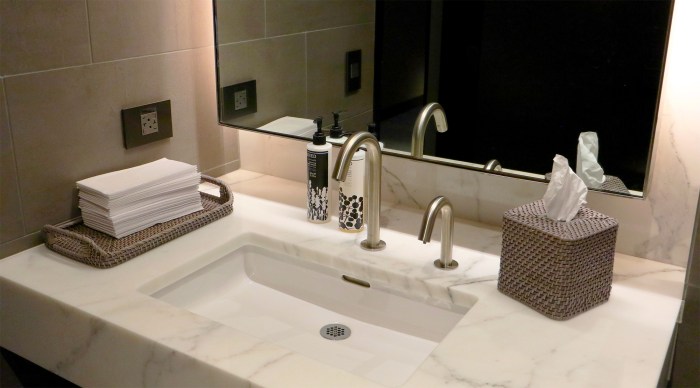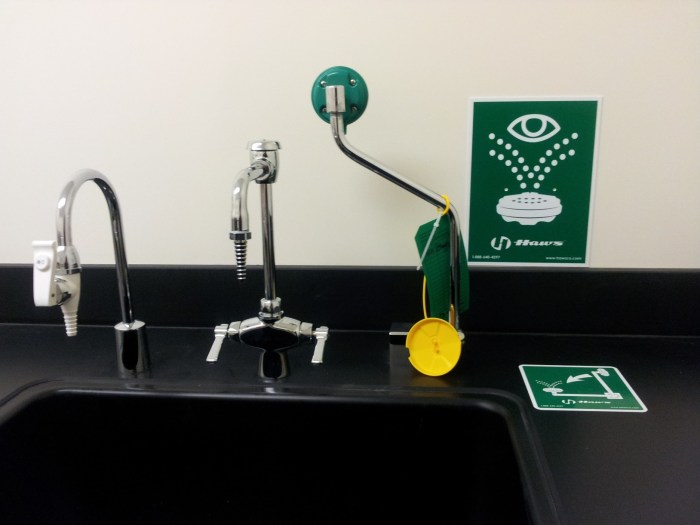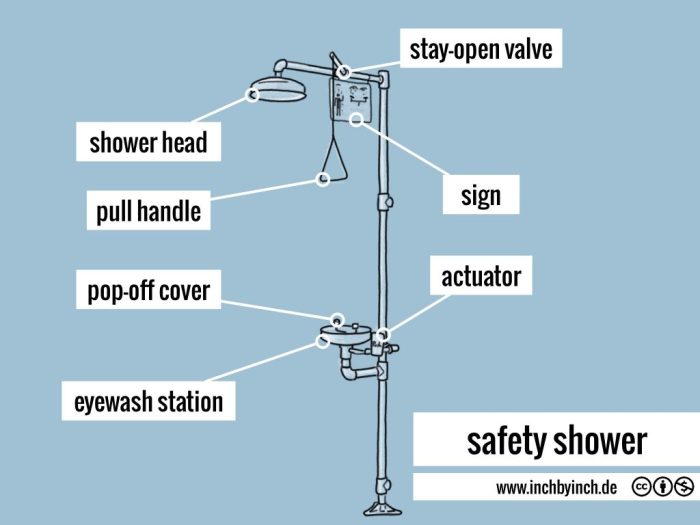Lab safety equipment alternatives shower or sink – In the realm of laboratory safety, the availability of alternative safety equipment is paramount, particularly when emergencies arise. This article delves into viable alternatives to showers and sinks for emergency decontamination, exploring their advantages and disadvantages to ensure optimal preparedness in laboratory settings.
From portable eyewash stations to chemical-resistant suits, we will uncover the diverse options available and provide guidance on proper decontamination procedures, training protocols, and emergency preparedness plans. By equipping laboratories with comprehensive safety measures, we can mitigate risks and safeguard the well-being of personnel.
Safety Equipment Alternatives for Showers and Sinks

In the event of an emergency, having alternative safety equipment is crucial. Showers and sinks are the primary decontamination sources, but alternatives must be considered in case of their unavailability.
Potential Alternatives
- Eye wash stations:Designed for eye decontamination, they provide a steady stream of water for flushing chemicals or debris.
- Safety blankets:Used for wrapping contaminated individuals, they prevent further contact with hazardous substances.
- Decontamination wipes:Pre-moistened wipes containing a neutralizing agent, they can be used to clean skin and surfaces.
- Bottled water:In the absence of running water, bottled water can be used for rinsing and diluting contaminants.
- Spill kits:Contain absorbent materials, such as pads or booms, for containing and absorbing spills.
Each alternative has its advantages and disadvantages, which should be considered when selecting the most appropriate option.
Decontamination Procedures

Proper decontamination procedures are essential when using alternative safety equipment:
Eye Decontamination
- Flush eyes with water or eye wash solution for at least 15 minutes.
- Keep eyes open and roll them in all directions to ensure thorough rinsing.
Skin Decontamination
- Remove contaminated clothing and jewelry.
- Rinse skin with water or a decontamination solution for at least 15 minutes.
- Use soap and water to wash affected areas thoroughly.
Decontamination Solutions, Lab safety equipment alternatives shower or sink
Various decontamination solutions can be used, including:
- Water:Most effective for diluting and rinsing away contaminants.
- Saline solution:Isotonic to body fluids, making it less irritating to eyes and skin.
- Sodium bicarbonate solution:Neutralizes acids and is useful for decontaminating chemicals like acids and bases.
Disposal of Contaminated Materials
Contaminated materials must be disposed of safely:
- Soiled clothing and rags should be placed in a leak-proof container.
- Used decontamination solutions should be neutralized and disposed of according to local regulations.
Training and Education: Lab Safety Equipment Alternatives Shower Or Sink

Training employees on the use of alternative safety equipment is crucial:
Types of Training
- Classroom training:Covers theoretical knowledge and principles.
- Hands-on practice:Allows employees to practice using the equipment in a simulated environment.
- Mock drills:Tests employees’ response and preparedness in an emergency situation.
Benefits of Training
- Increased awareness and understanding of safety protocols.
- Enhanced ability to respond quickly and effectively to emergencies.
- Improved confidence in using alternative safety equipment.
Regular Refresher Training
Regular refresher training is essential to ensure employees remain proficient in the use of alternative safety equipment.
Emergency Preparedness Plan
An emergency preparedness plan that includes the use of alternative safety equipment is vital:
Plan Template
An emergency preparedness plan should include the following:
- Identification of potential emergencies.
- Roles and responsibilities of personnel.
- Location and availability of alternative safety equipment.
- Decontamination procedures.
- Communication and notification procedures.
Regular Review and Updates
The emergency preparedness plan should be reviewed and updated regularly to ensure its effectiveness.
User Queries
What are the advantages of using portable eyewash stations as an alternative to showers?
Portable eyewash stations offer flexibility and can be placed in areas where showers are not readily accessible, providing immediate access to emergency eye flushing.
How should chemical-resistant suits be disposed of after use?
Chemical-resistant suits should be properly decontaminated and disposed of according to hazardous waste protocols to prevent chemical exposure and environmental contamination.
What is the importance of regular refresher training on the use of alternative safety equipment?
Regular refresher training ensures that laboratory personnel remain familiar with the proper use and maintenance of alternative safety equipment, enhancing their ability to respond effectively in emergencies.